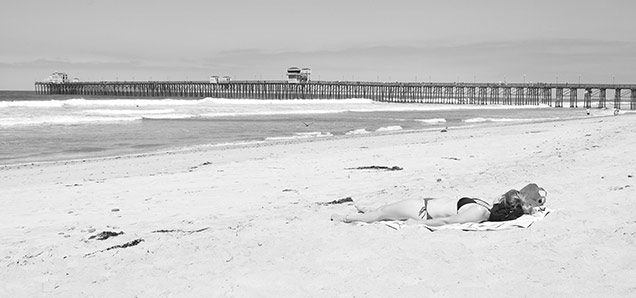Rumours of Grace: In search of the perfect beach
 CREDIT: "BEACH TIME!" BY JOSHUA OMMEN ON FLICKR. LICENSED UNDER CC BY-NC-SA 2.0 / DESATURATED
CREDIT: "BEACH TIME!" BY JOSHUA OMMEN ON FLICKR. LICENSED UNDER CC BY-NC-SA 2.0 / DESATURATEDMany of the Worlds beaches, including some in California are artificial.
The other day, I was saying to someone that if oil prices remain low, the economies of some Middle East countries will take a hit.
Well, if they can no longer profit from the sale of oil, maybe some of those countries can try exporting sand. It seemed humorous to imagine boatloads of sand replacing boatloads of oil. Who would pay $120 or even $40 – wholesale – for a barrel of sand?
It seemed funny until someone said to me that many of the beaches of California and Florida are artificial.
What?
A little research online says this is true. Finding sand to enlarge famous beaches has been going on for some time. One example is Miami Beach. From 1976 to 1981, sand was dredged up from the seabed to replenish the beach at a cost of $64 million.
This brings to mind the issue of how much we expect from this planet.
There are two remarkable stories of the creation of the world, which suggest that if anything, we should reduce that demand.
In one of them, the creation springs from deep within the being of the creator. He speaks and the visible universe comes into existence. In the second he is a sculptor, shaping human figures and then breathing life into their nostrils, transforming into a living beings. He plants a garden for these humans to inhabit and enjoy. These stories are found on pages one and two of the Christian and Jewish Bible.
Thanks to science, our understanding of the created world has become extremely complex and fascinating. We have even more reason to see the mindfulness of our world and to appreciate the patient and intricate work of the creator – God.
But we don’t treat it well. Even though we are completely informed about the problems of fossil fuels and global warming, we continue to fly. We so this even when much of our flying is not necessary but is done in the pursuit of luxury – in the hunt for that perfect.
Even though we know that fossil fuel- based land transportation is among the killers stalking our planet, we continue to build economies around the internal combustion engine and around road infrastructure.
It is as if we are crazy. We know we are killing the planet, but we hardly dare to step out of destructive habits. We build college programs on the assumption of an endless supply of cheap energy. No one is taught to grow his/her own food. Many are taught to become merchants of the perfect beach.
There will be much weeping over the losses to the Canadian economy if the oil sands turn out to be unprofitable because of falling oil prices. And yet, there should be street parties in celebration of any efforts to cease the development of fossil fuel extraction and use.
What is needed is a recovery of an appreciation for the origins of the creation in God. If he invested his thought, will and words into the stupendous planet and even more stupendous universe we inhabit, should we not treat the earth with greater care?
Shouldn’t we cease to harm it?
We have devalued the creation and need to re-value it. Perhaps the easiest way that we can do that is to demand less of it, which is simpler than it sounds. Any of us can purchase a smaller car than we want. Or we can drive slower, which quickly reduces fuel consumption – or less. Some of us can purchase local farm produce.
By demanding less, we will have more. When consumption and pollution levels drop, our planet will become healthier. Yes, economists will complain. But they also did so before slavery was abolished. Yet they survived along with the rest of us.
The removal of the blight of slavery outside of the Middle East and Africa where it persists, has made our world a more humane place. The removal of the blight of endless consumption will also make our world a better place.
We need to do the right thing, on a small scale, if that is all we can do, and on a larger scale to the best of our abilities. The economy will adjust.
Michael Veenema was a chaplain at Fanshawe College until 2004. He lives in Nova Scotia, where he is a pastor and a chaplain. He continues to write.
Editorial opinions or comments expressed in this online edition of Interrobang newspaper reflect the views of the writer and are not those of the Interrobang or the Fanshawe Student Union. The Interrobang is published weekly by the Fanshawe Student Union at 1001 Fanshawe College Blvd., P.O. Box 7005, London, Ontario, N5Y 5R6 and distributed through the Fanshawe College community. Letters to the editor are welcome. All letters are subject to editing and should be emailed. All letters must be accompanied by contact information. Letters can also be submitted online by clicking here.













